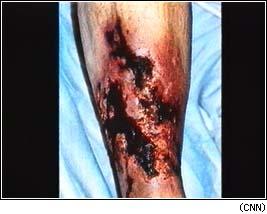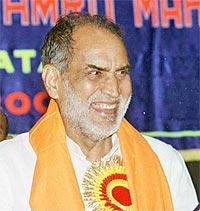
Hi folks. What's going on?
I think those of us who are outside of Nepal will have to go public with our real, full names. Compare that to people in Nepal who brave the police/army to go into the streets. And if the idea is to enlarge the organization and garner as much publicity as possible, we need to go and stay public.
Mahatma Gandhi early on was for equality for Indians within the British imperial framework. Only later on did he come around to thinking independence was the only option if equality is to be achieved. I feel a lot of so-called Nepali democrats are still foggy in their minds about democracy. They refuse to see this regime for what it is. It is an autocratic setup, period. Either you are for autocracy or you are for democracy. There is no middle ground. And so the rallying cry ought be for a Democratic Republic. But I am open to debate and discussion. Second, it is perfectly okay, and largely desirable, to critique the performance of the players during the 1990s, but none of that criticism leads to the conclusion the democratic system itself is bad. The problem was too little democracy, not too much: the army under the king and not the parliament, no mechanisms to curb corruption, no decentralization, unregulated fund-raising by the parties, not enough empowerment for the local governments, and so on. And so we have to heighten and intensify the critique to ensure the next round of democracy is more complete.
As for Dinesh Prasain's possible 20-day trip in the DC-Boston corridor during April, I am all for it. If we can only highlight the human rights situation, that will be great. But I think it might also add fuel to the democracy debate. And I think we should make full use of Dinesh' personal story, things like his escape to Delhi and so on.
We need to move beyond making statements and actually organize and think up a plan of action. I have already proposed what I have, but I would like as many others as possible also to weigh in. The dialogue for democracy has to be democratic and inclusive.
About fund-raising, I think we need to get small amonts from large numbers of people. Kiran, do you think you could set up a PayPal account and start collecting money and make public all collections and expenses online in real time? DC, Baltimore, Philly, NYC, Boston. If we can get 20 people per city to contribute $50 each, that is $5000, more than enough for the trip and any follow-up we might have to do. Some of that money could also go for Delhi-based field work.
Yubaraj, do you think you could start emailing and calling up South Asian student associations in the corridor to arrange talk programs for Dinesh? Let's pack it up? All they will have to do to participate is to pick Dinesh up, arrange a 40-60 minute gathering, and whisk him away to his next assignment, and feed him if it is meal time. That is very little to ask. I am thinking Dinesh Prasain talking at Harvard, like Manisha Koirala. He is a stud himself!
Kiran, can you please arrange a camcorder and a digital camera to accompany Dinesh at all times? We will have to produce and copy DVDs and VCDs of the visit that could be a great help when we work to establish our "ring" along the Nepal-India border. The photos would go online to some place like Yahoo Photos.
And house parties. everyone. Let's pack all 20 evenings and every weekend in between with house parties. Dinesh would give a 15-minute presentation and then open up the floor for discussion. We could do 2-3 per evening. I expect a lot of people to bring up the human rights abuses by the Maoists. Response: we are against those as well.
Finally, the US Congress. All the build-up will have to culminate in action on Capitol Hill. I think the goal should be to have the Congress pass a resolution that will gradually tighten the noose around the junta in Kathmandu.
And let's be blogging more widely. I think Dinesh should provide a running commentary in blog format during his trip.
In The News Today
- REBELS ATTACK IN NEPAL Special Broadcasting Service, Australia ....one of the biggest rebel assaults since King Gyanendra's seizure of power and suspension of civil liberties last month which has drawn international criticism. ....The attack followed a state media report that Nepal has a "clear roadmap" to restore democracy
- Russians cautioned against visiting Nepal: New Kerala, India .....due to "complex internal situation" and the Maoist insurgency
- Shrinking foreign aid worries planners in Nepal Daily Times, Pakistan ....About 70 percent of the development budget is dependent on foreign aid ......escalating communist insurgency has frightened off foreign tourists in recent years, depriving Nepal of one of its main sources of revenue...... if the situation continues, the economy could plunge......For this fiscal year, which ends in July, foreign aid makes up 32 billion rupees (US$450 million; euro340 million) of the 42 billion rupees (US$590 million; euro440 million) budget allocated for development projects.
- Nepal in Twilight CounterPunch, CA .....the Maoists with their blind devotion to violent insurgency .....Only five years ago the Maoist threat seemed unreal and faraway...... Through their wanton destruction of development infrastructure and physical elimination of opposition, Maoists show the same tendnecy to barbarism that befell Cambodia in the seventies. They even dream of reviving the corpse of communism on a world stage......The king is both feared and supported at the same time...... The likely scenario in the absence of monarchy is not a peaceful democratic country but Nepal joining the ranks of Afghanistan and Cambodia after the overthrow of the monarchy......The coming of republic must come through peaceful revolution or evolution in future...... The moral of the Maoist cadres is high; they sense an imminent victory. Political parties are divided....... The propaganda line that the Maoists will give up violence if a constitutional assembly is agreed to is delusive...... The Maoists had all the peaceful avenues before them to bring about social transformation. Their weapons of choice are violence and terror...... The king, in spite of his intellectual shortcomings .....He is not trying to act as he he was another Musharaff of Pakistan......A man saved by the mysterious providence, he should devote his rule to liberate Nepal from this darkness of the Maoist terror.
- Unicef Appeals Warring Factions In Nepal To Allow Health Drive
SouthAsia Network ..... “The warring sides need to put the health of Nepal’s children first, and allow the national distribution of Vitamin A capsules and de-worming tablets to 3.3 million children to take place as scheduled in April” ..... About 50 percent Nepalese children are stunted and malnourished. Intestinal worm infections, a chronic problem, further reduce the amount of iron they absorb, leaving them weak and anaemic ..... Almost 70,000 die each year from preventable causes - Another Blow to the King of Nepal CounterPunch, CA ......European Parliament's latest call to impose smart sanctions against the ruling elites in government and the military until democracy is restored in Nepal .....the King Gyanendra's blistering reaction about India and Britain's suspension of military aid indicates that rulers in Nepal seem in a desperate disposition..... Gyanendra joined a club of the South Asian of dictators along with Pakistan, Burma (Myanmar), Bhutan and Maldives ..... Dictators love to keep their people in dark. The army of Nepal, though its' name is like Royal Nepalese Army, if fact, it is a royal army that exclusively obeys royal orders...... the army defied the orders of civilian government during the early days of Maoists insurgency in 1990s ..... Nepal ranks on top of the list of missing persons under the security custody ..... royal army is a place of exploitation between two classes. The upper elite classes mostly blessed by the royal networks, and the lower class comprised of people from poor households .....lower classes are forced to combat with Maoists guerilla without even proper arms and ammunitions ...... The middle level army officers have been penalized by both royalists and Maoists...... King and his army has the highest un-audited expenses in the history of Nepal ......the most non-transparent institutions in Nepal are the King's Palace and Army's expenses .....In such background, the new royal commission on corruption seems a new intimidation tool. ..... few members of the new royal commission are infamous custom officers until 1990 .....Unfortunately, government formed after 1990 never bothered to dig on the Mallik Commission. ......It seems that except King and his coterie nobody inside and outside the country understands the basics of democracy...... Why so many students are escaping from their homes in search of a shelter and security in India? ..... his absolutism monarchial theory ..... China, Pakistan, and Russia .....China will reciprocate its' Myanmar policy to Nepal ...... international isolation and civil war are two very unwanted future scenarios .....the US as harbinger of liberty timely intervene to break the axis of dictators in the region
- Nepal says has clear roadmap to restore democracy Channel News Asia, Singapore .....Koirala, were being kept in detention for fear they could rally popular protests against the king's move ..... "In our war against terrorism, the nation has firmly made up its mind that there will be no wavering," Bista said.
- Nepal Foreign Minister to visit India NDTV.com, India
- Text of Natwar Singh's statement in Rajya Sabha: New Kerala .....The developments in Nepal constitute a serious setback to democracy and bring the monarchy and mainstream political parties in direct confrontation with each other. .....The Sashastra Seema Bal which is responsible for guarding India-Nepal border has been asked to step up vigilance and patrolling along the border.
- Maoists go on arson spree in western Nepal: New Kerala, India ..... About 100 Maoist insurgents attacked Sandhikharka town in western Arghakhanchi district midnight Friday, burning down first a security barrack and then several government offices......Around 500 rebels had looted and torched the TV centre of Nepal Television, causing damage worth millions......Hinting at the government stepping up military operations against the Maoists, the minister said, "In our war against terrorism, there will be no wavering".
- UN: Congo, Nepal fighting threatens aid Seattle Post Intelligencer .....UNICEF also called upon government and rebel forces in Nepal's nine-year civil war to help with the distribution of vaccines, vitamins and other drugs, without which thousands of children could die......In Nepal, conflict in the Himalayan nation has already displaced between 200,000 and 400,000 Nepalese, and many more are threatened, the United Nations has said....."Both sides need to put the health of Nepal's children first," Bellamy added, citing the twice-yearly distribution of Vitamin A and the national measles vaccination campaign as key health campaigns.
- Nepalese find life's hell without their cells Chicago Sun-Times ......Small businessmen can't take orders, children can't phone their parents, and political activists can't call around to organize a decent-sized protest...... a third of Nepal's telephone lines are cellular....Nepal has about 246,000 cell phone subscribers, a number that has grown dramatically in the five years they've been available here. For most Nepalese, there's no alternative: Getting a land line phone can mean a five-year wait.
- life without cell phones USA Today .....Last year, Nepal Telcom, a government-owned company with a cell phone monopoly, announced 50,000 new lines. But more than 150,000 people lined up outside company officers nationwide. In some cities, police beat back applicants with batons..... Nepal Telecom, which is losing $70,000 daily in revenue .....Nepal Telecom chief Sugat Kansakar said that even when service does start, it would be in phases, with subscribers having to reregister.
- India's new double standard The Japan Times .....The growing warmth in U.S.-Indian relations is getting strangely reflected in India's adoption of U.S.-style dual standards on democracy...... the United States has had a penchant to cozy up to dictators in strategically located or resource-rich nations while advocating democracy to others ...... the shah of Iran, Mobutu Sese Seko in Congo, Ferdinand Marcos in the Philippines, Suharto in Indonesia and Saddam Hussein in Iraq ..... Washington today toasts President Gen. Pervez Musharraf of Pakistan as a model ruler and friend, showering his regime with billions of dollars in aid ...... New Delhi and Washington have joined hands to promote democracy in Nepal while keeping mum on the strengthening of Pakistan's one-man junta....... a despotic king with a wayward son as heir to the throne gives India little comfort ...... A Maoist triumph in Nepal, which has open borders with India, would be like the Talibanization of a member-state of the European Union. ...... an overly ambitious China, which has been adroit at seizing any opportunity that a state's isolation may open up, as it has shown in Myanmar, Iran and elsewhere..... Nepal, which former leader Mao Zedong had described as one of the fingers of the Tibetan palm, the other fingers, according to him, being Bhutan and three Indian states -- Sikkim, Arunachal Pradesh and Kashmir. China occupies one-fifth of Kashmir and, in its maps, shows Sikkim as independent and Arunachal Pradesh as its territory ...... in Pakistan, where military rule has usually fattened India-hating, Punjabi-dominated governing elites ready to try out their fantasies on the battlefield...... classifies nations with a built-in craving for revision or hazardous gain as "wolves" and "jackals," and status quo states as "lambs" or "lions." India eminently qualifies as a "lamb," wedged between "wolf" China and "jackal" Pakistan. Lamb-like, India is wary of backing friends but eager to please enemies...... In staging the royal coup in defiance of India's express warning, the monarch called India's bluff. ..... Contrast India's reticence with China's outspokenness. ..... the need for China to come clean on its illicit nuclear transfers to Pakistan and missile sales to Islamabad and Tehran. ..... As the only thriving democracy in a vast region stretching from Jordan to China, India can rightly be proud of its deeply-rooted democratic traditions. It is spot on in seeking the emergence of "the whole of South Asia," in the recent words of its foreign secretary, as "a community of flourishing democracies." Democracies, by structure and disposition, have a partiality toward cooperation and conciliation.
- Indian assistance to Nepal to continue: Envoy Gorkhapatra, Nepal .....the assistance to the education and health sector development of Nepal will also continue.





